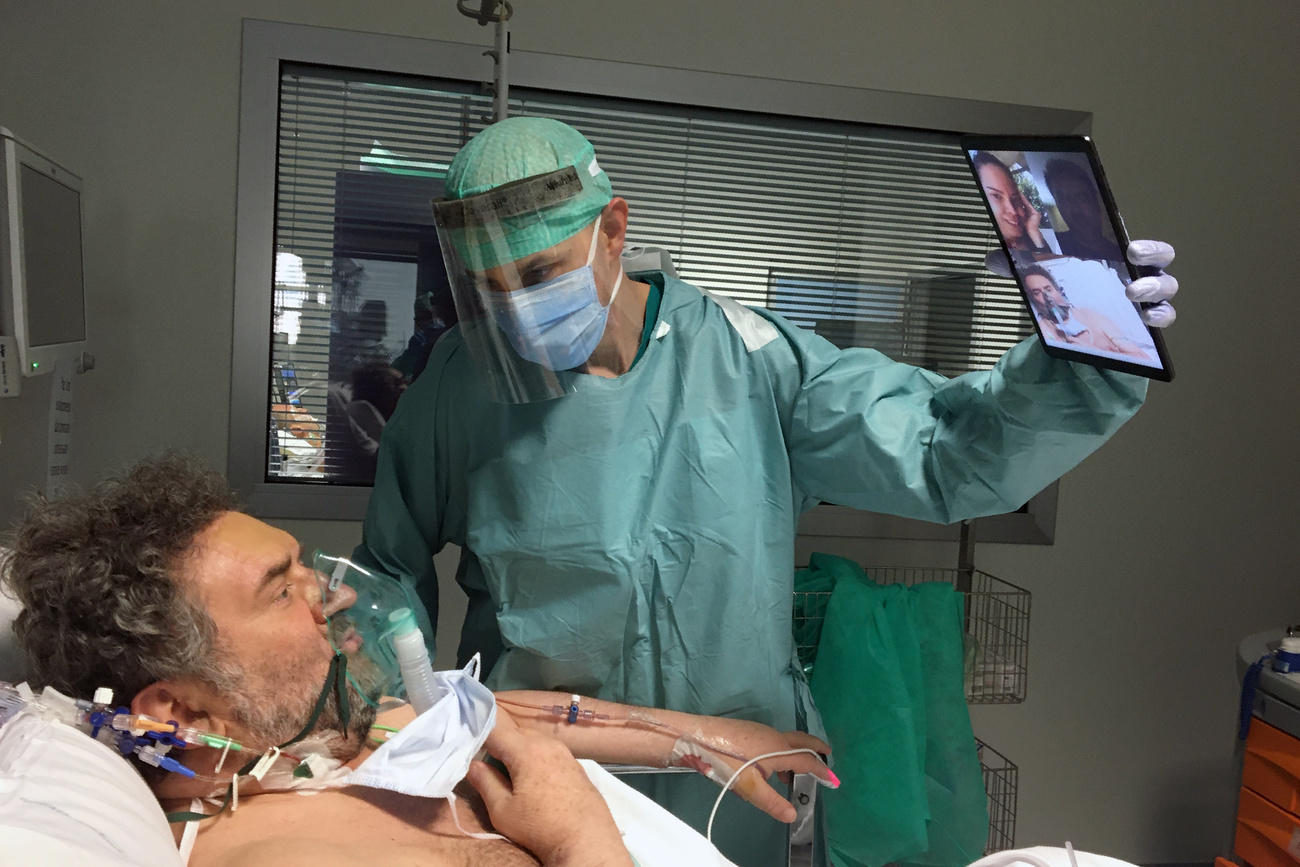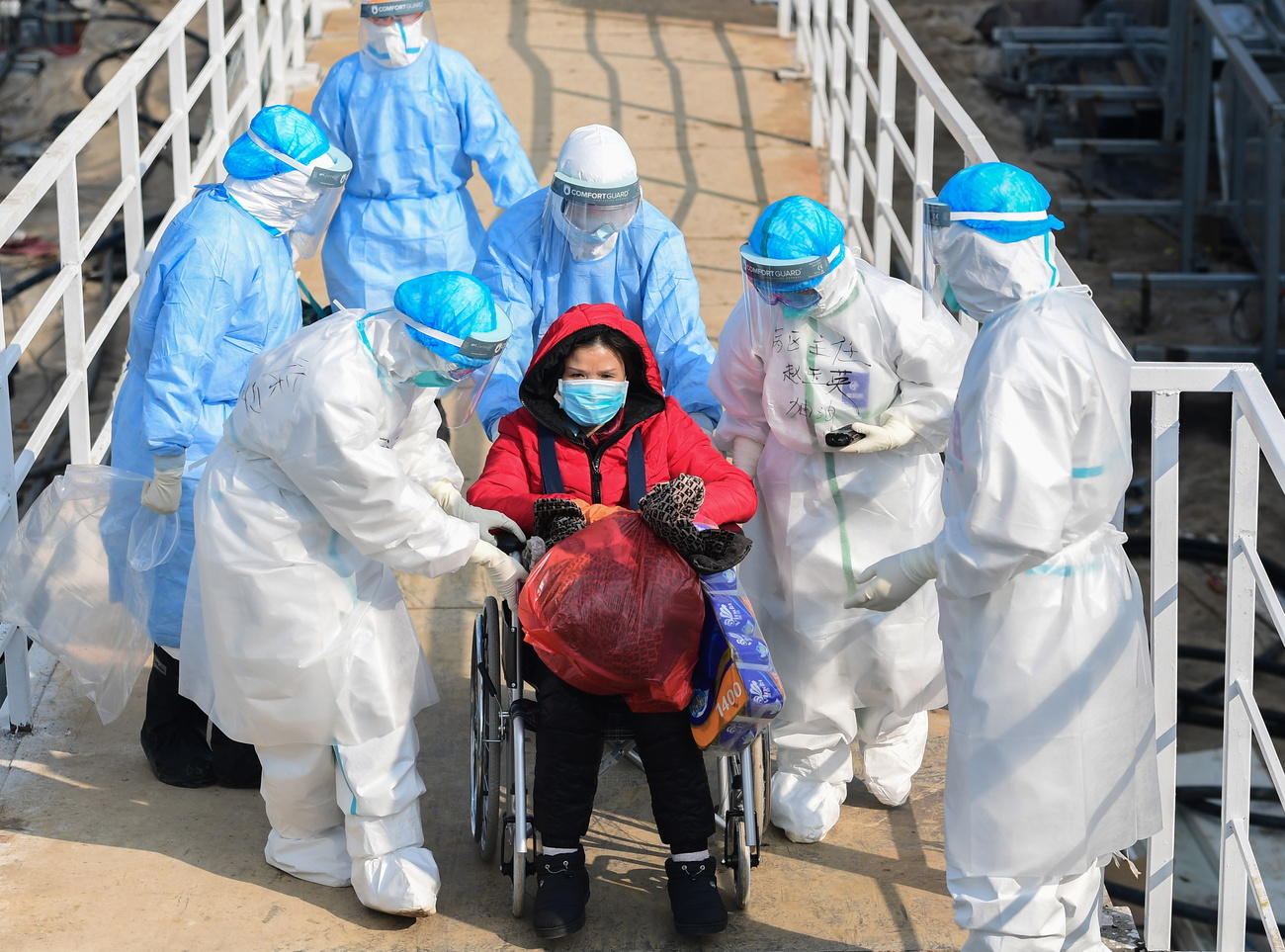Global cooperation needed to prevent Covid-19 drugs ‘free-for-all’

Nations must pool resources and agree on how information and technology is fairly shared in the global fight against coronavirus to prevent the situation spiralling out of control, warns Geneva-based public health expert Suerie Moon.
Currently, more than 531,600 people have been infected by the virus in 203 countries and territories, and over 24,000 have died, according to a Reuters tally.
Dr Suerie MoonExternal link is co-director of the Global Health Centre at the Geneva Graduate Institute and an expert in global health, governance and infectious diseases.
swissinfo.ch: The World Health Organization (WHO) is facing immense scrutiny with the coronavirus pandemic. What’s your view on the UN agency’s leadership role?
Suerie Moon: Overall, WHO has done an excellent job, especially given the limited tools it has available, whether legal, financial or other. If you compare the situation to the 2014-2016 West Africa Ebola epidemic or the 2009 novel H1N1 pandemic [also known as swine flu], it’s really night and day.
WHO has exhibited strong leadership and been consistently in front of the cameras, exhorting governments to do more and issuing guidance very quickly on a number of topics which are important for health workers and employers. They’ve worked tirelessly. Their work coordinating scientific research has also been essential.
We know that WHO’s guidance is particularly relied upon in developing countries, where it is referred to as the Bible. So their advice and political leadership is going to be even more essential in the weeks and months to come as the epidemic becomes truly global.

swissinfo.ch: But WHO has again been under fire, with critics saying it did not react quickly or strongly enough to the new coronavirus, which emerged in Wuhan, China, late last year. What should it have done differently?
S.M.: WHO has done many things very well under extremely difficult circumstances and amid huge uncertainty. But some of their guidance has been puzzling. WHO’s bread and butter is issuing guidance to healthcare workers. But here WHO is being asked to do something very different that is outside its comfort zone – issuing guidance on containment measures that have massive economic and social consequences.
One of the critiques of WHO in the past and one that still holds water is that it’s a very medical organisation. Its strengths are within the health sector but when crises spiral out of control and are not just about health – as is the case with coronavirus – the question is: “Who do we turn to then?”
swissinfo.ch: On March 26, G20 leaders pledged to inject over $5 trillion into the global economy and “do whatever it takes to overcome the pandemic.” On health, they committed to close the financing gap in the WHO’s response plan and strengthen its mandate as well as expand manufacturing capacity of medical supplies, strengthen capacities to respond to infectious diseases, and share clinical data. Have leaders finally woken up for the need for global cooperation to fight the virus?
S.M.: The G20 statementExternal link that came out on Thursday is a very encouraging sign going forward because so far international cooperation has been virtually absent.
I hope countries stop looking purely inwards and start paying attention to the deep and profound level of international cooperation that is needed to get this pandemic under control.
The G20 statement really hit the nail on the head about the multiple areas where we need more robust and reliable cooperation than we’ve seen. At a very human level I understand why governments have been focused inwards as all the major countries we rely on to lead at the global level have been wrestling with domestic emergencies all at the same time. So it’s understandable, but we cannot afford to ignore the international level and need to have international cooperation to put out this fire.
I think the intention and the breadth of issues covered by the G20 statement is highly encouraging. But once things come down to money and information – where the rubber meets the road – and real resources and power, we’ll have to see what pans out.
swissinfo.ch: You have expressed concerns that looking ahead countries must reach global agreements to ensure that when effective drugs and faster diagnostics and vaccines are available, they reach the people who need them most and first.
S.M.: Before we even know which medicines we need, countries with manufacturing capacity are blocking exports and hoarding medicines. We’ve also seen this with masks and protective materials.
Imagine poor countries that don’t have the diplomatic or financial muscle of a European country – they will be the last in line.
Vaccines are coming down the pipeline in the next 12-18 months, but the drug issue is around the corner. We have small trials already reporting results and soon we’ll have a clearer idea of what drugs, treatments and therapies are effective and when. We’re going to see more data in the coming weeks and governments will have greater certainty as to what they need.
The scramble to get those products is going to be unprecedented. It’s going to be a free-for-all unless we can come up with a basic agreement on principles: products go to countries hardest hit first. This seems pretty basic but I don’t think it’s going to happen.
If we don’t reach international agreement on how we share information and technology and pool resources quickly it’s going to be chaos.

More
Coronavirus: the situation in Switzerland

In compliance with the JTI standards
More: SWI swissinfo.ch certified by the Journalism Trust Initiative












You can find an overview of ongoing debates with our journalists here . Please join us!
If you want to start a conversation about a topic raised in this article or want to report factual errors, email us at english@swissinfo.ch.